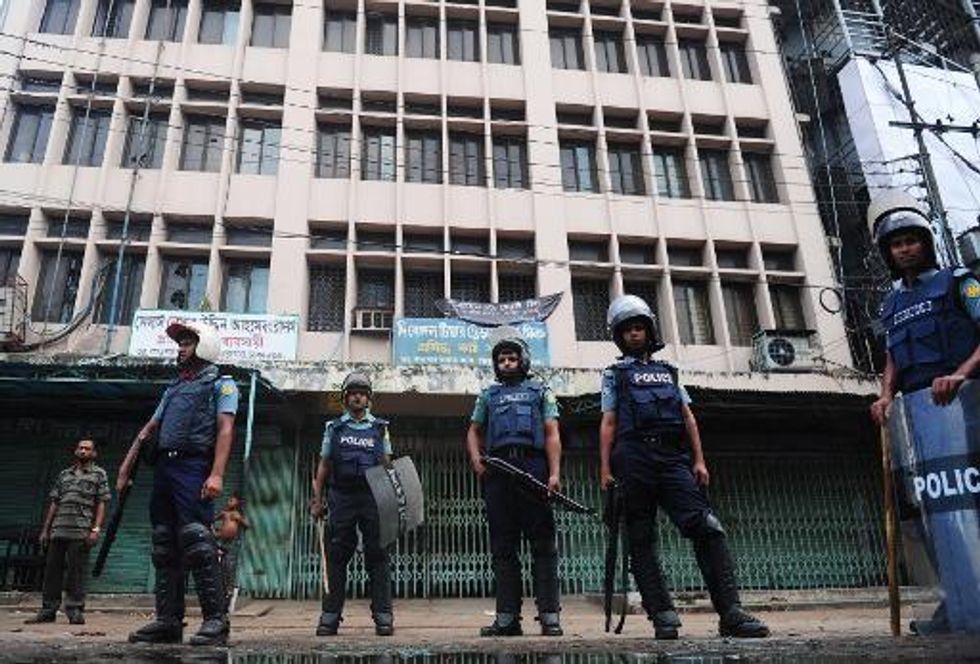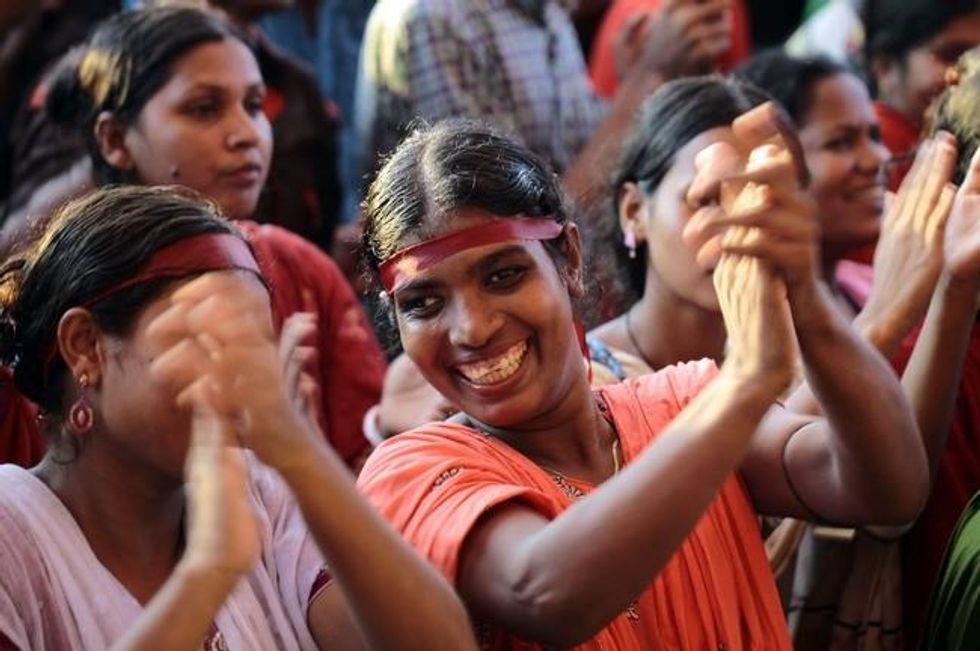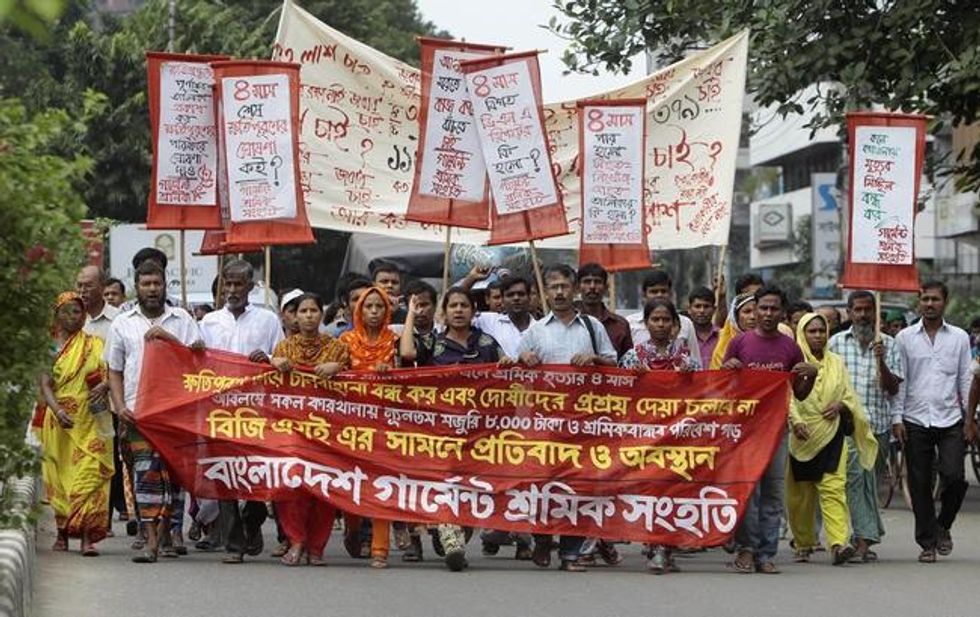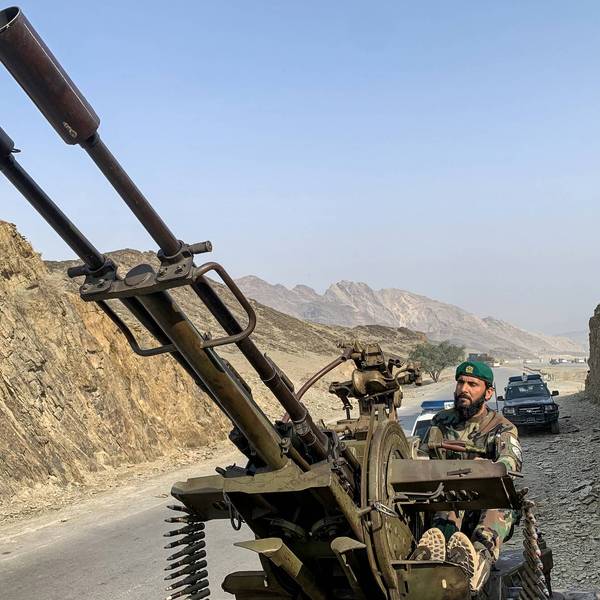Violent Crackdown in Bangladesh as Paramilitaries Flood Industrial Zone
'We need to make every effort to keep the Bangladeshi worker in the consciousness of people'

Bangladesh's government, known for its cozy relationship with the country's notoriously low-paying and dangerous garment industry backed by numerous U.S.-based corporations, has held a series of meetings with factory owners and vowed to take more harsh measures to shut down the uprisings.
"No one takes note of [Bangladeshi garment workers] unless of course they die under collapsing buildings or by fire... or they come out into the street blocking traffic and breaking windows." -Humayun Kabir, South Asia Solidarity Initiative
"Unrest in the garment sector will be firmly dealt with," Home Minister Muhiuddin Khan Alamgir told reporters Wednesday, Bloomberg reports.
This escalation adds to mounting violence on the part of "security forces" who have shot at record crowds with rubber bullets and tear gas and beaten them with batons, injuring scores.
Over the past week, more than 200,000 garment workers launched record protests and strikes, shutting down factories, blocking traffic, clashing with police, and even taking the step of setting their own workplaces on fire to protest dismal conditions and poverty pay.
While the media is reporting that many of the factories have reopened, thousands of workers continue to protest and clash with police in the industrial outskirts of Dhaka. AFP reports that The Bangladesh Garment and Industrial Workers Federation has received "assurances" that wages will be increased in the future, but is not clear when or how much these workers can expect.
The week of record protests were touched off by factory owners' refusal to meet garment workers' demands for a pay increase that would bring them to monthly earnings of $100 dollars in an industry that pays some of the lowest wages in the world.
Bangladesh's garment industry--which employs a workforce that is 80 percent women from rural areas--has faced mounting protests since the collapse of a factory in April killed more than 1,200 workers and injured over 2,500, with most victims women--one of many tragedies to sweep the country's dangerous garment industry.
While the catastrophe captured global headlines, little has been done to improve the bleak conditions of an industry that sells to numerous U.S.-based corporations, including Walmart, Gap, Sears, Disney, and Benetton, and wages remain at deep poverty levels. Bangladesh has a bloody history of government and employer crackdown and attacks on workers attempting to organize to improve their conditions.
Humayun Kabir with the South Asia Solidarity Initiative told Common Dreams that now is a crucial time for global solidarity with garment workers who are suffering from a "lack of voice in Bangladeshi or world politics."
"No one takes note of them unless of course they die under collapsing buildings or by fire... or they come out into the street blocking traffic and breaking windows. And when they are pushed/beaten back to the factories, everyone forgets them again," he declared.
"We need to make every effort to keep the Bangladeshi worker in the consciousness of people," he added. "We have to remember that the garment workers are being exploited every day, even when they are working quietly in the factories."


_____________________
An Urgent Message From Our Co-Founder
Dear Common Dreams reader, The U.S. is on a fast track to authoritarianism like nothing I've ever seen. Meanwhile, corporate news outlets are utterly capitulating to Trump, twisting their coverage to avoid drawing his ire while lining up to stuff cash in his pockets. That's why I believe that Common Dreams is doing the best and most consequential reporting that we've ever done. Our small but mighty team is a progressive reporting powerhouse, covering the news every day that the corporate media never will. Our mission has always been simple: To inform. To inspire. And to ignite change for the common good. Now here's the key piece that I want all our readers to understand: None of this would be possible without your financial support. That's not just some fundraising cliche. It's the absolute and literal truth. We don't accept corporate advertising and never will. We don't have a paywall because we don't think people should be blocked from critical news based on their ability to pay. Everything we do is funded by the donations of readers like you. Will you donate now to help power the nonprofit, independent reporting of Common Dreams? Thank you for being a vital member of our community. Together, we can keep independent journalism alive when it’s needed most. - Craig Brown, Co-founder |

Bangladesh's government, known for its cozy relationship with the country's notoriously low-paying and dangerous garment industry backed by numerous U.S.-based corporations, has held a series of meetings with factory owners and vowed to take more harsh measures to shut down the uprisings.
"No one takes note of [Bangladeshi garment workers] unless of course they die under collapsing buildings or by fire... or they come out into the street blocking traffic and breaking windows." -Humayun Kabir, South Asia Solidarity Initiative
"Unrest in the garment sector will be firmly dealt with," Home Minister Muhiuddin Khan Alamgir told reporters Wednesday, Bloomberg reports.
This escalation adds to mounting violence on the part of "security forces" who have shot at record crowds with rubber bullets and tear gas and beaten them with batons, injuring scores.
Over the past week, more than 200,000 garment workers launched record protests and strikes, shutting down factories, blocking traffic, clashing with police, and even taking the step of setting their own workplaces on fire to protest dismal conditions and poverty pay.
While the media is reporting that many of the factories have reopened, thousands of workers continue to protest and clash with police in the industrial outskirts of Dhaka. AFP reports that The Bangladesh Garment and Industrial Workers Federation has received "assurances" that wages will be increased in the future, but is not clear when or how much these workers can expect.
The week of record protests were touched off by factory owners' refusal to meet garment workers' demands for a pay increase that would bring them to monthly earnings of $100 dollars in an industry that pays some of the lowest wages in the world.
Bangladesh's garment industry--which employs a workforce that is 80 percent women from rural areas--has faced mounting protests since the collapse of a factory in April killed more than 1,200 workers and injured over 2,500, with most victims women--one of many tragedies to sweep the country's dangerous garment industry.
While the catastrophe captured global headlines, little has been done to improve the bleak conditions of an industry that sells to numerous U.S.-based corporations, including Walmart, Gap, Sears, Disney, and Benetton, and wages remain at deep poverty levels. Bangladesh has a bloody history of government and employer crackdown and attacks on workers attempting to organize to improve their conditions.
Humayun Kabir with the South Asia Solidarity Initiative told Common Dreams that now is a crucial time for global solidarity with garment workers who are suffering from a "lack of voice in Bangladeshi or world politics."
"No one takes note of them unless of course they die under collapsing buildings or by fire... or they come out into the street blocking traffic and breaking windows. And when they are pushed/beaten back to the factories, everyone forgets them again," he declared.
"We need to make every effort to keep the Bangladeshi worker in the consciousness of people," he added. "We have to remember that the garment workers are being exploited every day, even when they are working quietly in the factories."


_____________________

Bangladesh's government, known for its cozy relationship with the country's notoriously low-paying and dangerous garment industry backed by numerous U.S.-based corporations, has held a series of meetings with factory owners and vowed to take more harsh measures to shut down the uprisings.
"No one takes note of [Bangladeshi garment workers] unless of course they die under collapsing buildings or by fire... or they come out into the street blocking traffic and breaking windows." -Humayun Kabir, South Asia Solidarity Initiative
"Unrest in the garment sector will be firmly dealt with," Home Minister Muhiuddin Khan Alamgir told reporters Wednesday, Bloomberg reports.
This escalation adds to mounting violence on the part of "security forces" who have shot at record crowds with rubber bullets and tear gas and beaten them with batons, injuring scores.
Over the past week, more than 200,000 garment workers launched record protests and strikes, shutting down factories, blocking traffic, clashing with police, and even taking the step of setting their own workplaces on fire to protest dismal conditions and poverty pay.
While the media is reporting that many of the factories have reopened, thousands of workers continue to protest and clash with police in the industrial outskirts of Dhaka. AFP reports that The Bangladesh Garment and Industrial Workers Federation has received "assurances" that wages will be increased in the future, but is not clear when or how much these workers can expect.
The week of record protests were touched off by factory owners' refusal to meet garment workers' demands for a pay increase that would bring them to monthly earnings of $100 dollars in an industry that pays some of the lowest wages in the world.
Bangladesh's garment industry--which employs a workforce that is 80 percent women from rural areas--has faced mounting protests since the collapse of a factory in April killed more than 1,200 workers and injured over 2,500, with most victims women--one of many tragedies to sweep the country's dangerous garment industry.
While the catastrophe captured global headlines, little has been done to improve the bleak conditions of an industry that sells to numerous U.S.-based corporations, including Walmart, Gap, Sears, Disney, and Benetton, and wages remain at deep poverty levels. Bangladesh has a bloody history of government and employer crackdown and attacks on workers attempting to organize to improve their conditions.
Humayun Kabir with the South Asia Solidarity Initiative told Common Dreams that now is a crucial time for global solidarity with garment workers who are suffering from a "lack of voice in Bangladeshi or world politics."
"No one takes note of them unless of course they die under collapsing buildings or by fire... or they come out into the street blocking traffic and breaking windows. And when they are pushed/beaten back to the factories, everyone forgets them again," he declared.
"We need to make every effort to keep the Bangladeshi worker in the consciousness of people," he added. "We have to remember that the garment workers are being exploited every day, even when they are working quietly in the factories."


_____________________

